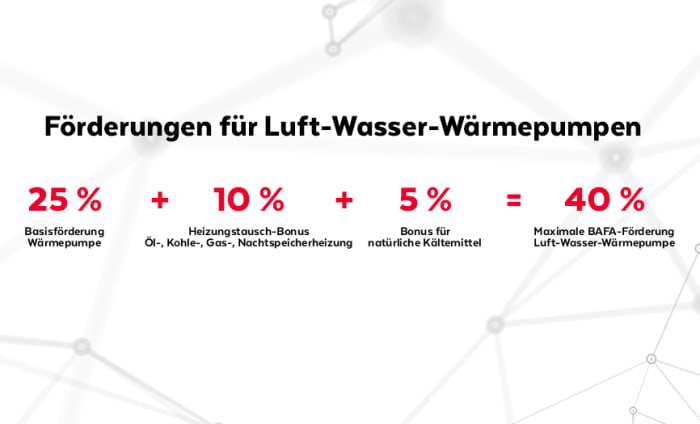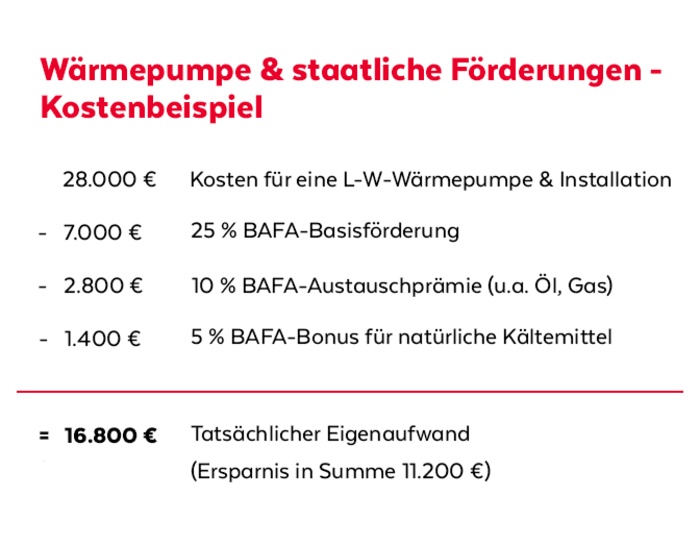Alexander Burkle – Heating exchange with subsidy
 Heat pumps are funded
Heat pumps are funded
The installation of a heat pump has become even more attractive and economical thanks to the BAFA subsidy rates, which have been in effect since the beginning of 2020. When replacing a gas or oil heating system, the state covers up to 40 percent of the costs. Investing in climate-friendly heating technology has never been as worthwhile as it is now.
The state subsidizes not only investments in a heat pump and its installation, but also environmental measures. These include, for example, the costs of developing heat sources, connecting to the heating system including all the necessary technical work and materials, replacing radiators, installing thermal storage, painting work in the boiler room or disposing of the old heating system.
How big is the promotion?
If you replace your old heating system with a heat pump, you can get state subsidies of up to 40% of the costs. The amount of the percentage subsidy depends on the measure carried out and the eligible costs. Up to 60,000 euros (per residential unit) can be credited as eligible costs in residential buildings.

How do you get the grant?
Alexander Bürkle is your contact and coordinates the entire implementation process. We accompany you step by step on the way to your heat pump – from the planning, the design and preparation of offers, the application for subsidies to the installation and commissioning of your heat pump. Since there are many different funding options for heat pumps, it is sometimes difficult to keep track. We will be happy to support you with the application for your new heat pump heating system and ensure that your financial burden is minimized.

Is the heating replacement worth it?
You quickly pay a five-digit sum to change a heating system. This sample calculation shows you how financially the possible subsidies for modernizing your heating system will help you.
Source
Alexander Burkle
EMR Analysis
More information on Alexander Bürkle: See the full profile on EMR Executive Services
More information on Andreas Ege (Managing Partner, Alexander Bürkle): See the full profile on EMR Executive Services
EMR Additional Notes:
- German Building Energy Act (GEG – Gebäudeenergiegesetz):
- https://www.bmi.bund.de/EN/topics/building-housing/building/energy-efficient-construction-renovation/buildings-energy-act/buildings-energy-act-node.html
- The new Buildings Energy Act sets out requirements for the energy performance of buildings, the issuing and application of energy performance certificates, and the use of renewable energy in buildings.
- The new Buildings Energy Act was promulgated in the Federal Law Gazette on 13 August 2020. The Buildings Energy Act was put forward by the Federal Government at the proposal of the Federal Ministry for Economic Affairs and Energy and the Federal Ministry of the Interior and Community. The German Bundestag adopted the Buildings Energy Act on 18 June 2020. The German Bundesrat confirmed this with its decision of 3 July 2020.
- The Buildings Energy Act implements the Coalition Agreement, the decisions reached at the 2018 housing summit and the measures set out in the Climate Action Programme 2030 in regard to energy conservation legislation for buildings.
- German Federal Funding for Energy-Efficient Buildings (BEG):
- https://de.fi-group.com/grants/federal-funding-for-efficient-buildings/?lang=en
- With the federal funding for efficient buildings (BEG), the Federal Ministry of Economics and Climate Protection (BMWK) supports energy efficiency and renewable energies in the building sector, the use of new heating systems, the optimization of existing heating systems, measures on the building envelope and the use of optimized system technology. The BEG is divided into three sub-programs:
- Federal funding for efficient buildings – residential buildings (BEG WG)
- Federal funding for efficient buildings – non-residential buildings (BEG NWG)
- Federal funding for efficient buildings – individual measures (BEG EM)
- Funding is provided either as a non-repayable investment grant or in the form of a loan with a repayment grant.
- German Bundesamt für Wirtschaft und Ausfuhrkontrolle (BAFA) Subsidies:
- https://www.bafa.de/EN/Promotion_Economic_Development_SME/promotion_economic_development_sme_node.html
- Small and medium-sized enterprises (SMEs) are an important factor in the success of the German economy. Over 99 % of all companies in Germany are part of the SME sector and therefore shape Germany’s suitability as a location for business and investment. They provide 55 % of jobs and 80 % of trainee positions, and are Germany’s most important innovation and technology factor.
- The goal of economic and SME policy is to boost competitiveness, innovation and employment in the sector. BAFA plays an important role in this regard through its many support programmes, project funding and other measures.
- In this way, BAFA reflects economic policy and implements policy decisions made by the Federal Government. It pursues a diverse and dynamic range of tasks, from funding of innovative start-ups, supporting small and medium-sized enterprises in business activities abroad or structural change projects, through to special funding measures, e. g., during the coronavirus pandemic.
- In 2021 BAFA spent over € 3.2 billion on its various funding measures.

